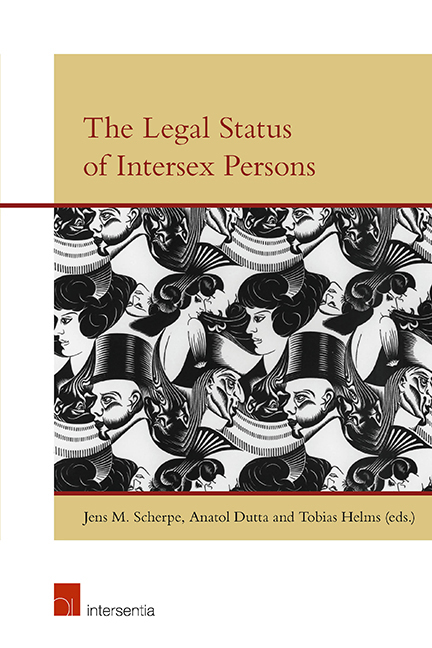Book contents
- Frontmatter
- Preface
- Contents
- List of Contributors
- The Legal Status of Intersex Persons: An Introduction
- Malta Declaration
- Darlington Statement
- Vienna Statement
- PART I MEDICINE AND PSYCHOLOGY
- PART II THEOLOGY AND LEGAL HISTORY
- Intersex in the Christian Tradition: Personhood and Embodiment
- Four Sexes, Two Genders: The Rabbinic Move from Legal to Essentialist Polarisation of Identities
- Intersex: Some (Legal-)Historical Background
- PART III TRANSGENDER, TRANSSEXUALITY AND INTERSEX
- PART IV NATIONAL LEGAL DEVELOPMENTS
- PART V PRIVATE INTERNATIONAL LAW ASPECTS OF INTERSEX
- PART VI INTERSEX AND HUMAN RIGHTS
Intersex: Some (Legal-)Historical Background
from PART II - THEOLOGY AND LEGAL HISTORY
Published online by Cambridge University Press: 31 January 2019
- Frontmatter
- Preface
- Contents
- List of Contributors
- The Legal Status of Intersex Persons: An Introduction
- Malta Declaration
- Darlington Statement
- Vienna Statement
- PART I MEDICINE AND PSYCHOLOGY
- PART II THEOLOGY AND LEGAL HISTORY
- Intersex in the Christian Tradition: Personhood and Embodiment
- Four Sexes, Two Genders: The Rabbinic Move from Legal to Essentialist Polarisation of Identities
- Intersex: Some (Legal-)Historical Background
- PART III TRANSGENDER, TRANSSEXUALITY AND INTERSEX
- PART IV NATIONAL LEGAL DEVELOPMENTS
- PART V PRIVATE INTERNATIONAL LAW ASPECTS OF INTERSEX
- PART VI INTERSEX AND HUMAN RIGHTS
Summary
Until the eighteenth century, the legal approach to ‘hermaphrodites’, although it presented distinctive features, was influenced by ancient classical texts and by post-classical literature and scholarship. The latter were in turn more or less informed by the ancient sources, but often also reprocessing those sources for contemporary political or social purposes. Both canon law and secular law were also influenced by Christian religious beliefs and doctrines, which to some extent affected the broader popular culture and attitudes to sexuality and gender issues. As those scholarly and popular approaches sometimes intertwined with legal (in particular, forensic) discussions of intersex cases, a brief introductory reference to some aspects of that broader cultural context may be useful. Another necessary contextualisation (which, however, can only be mentioned peripherally in this introductory contribution) is the interaction between medical science and law on this issue.
THE WESTERN CULTURAL TRADITION: THE ‘HERMAPHRODITE’ AS A TOPOS DRAWN AND ADAPTED FROM THE ANCIENT CLASSICAL CULTURE
Among the non-legal sources which have affected legal literature and thinking on transsexuality, intersexuality, sexual orientations, and gender issues in general, the Greek-Roman mythology – as witnessed already by the continuous use of the word ‘hermaphrodite’ as a term of art in legal authorities until the nineteenth century – has been a powerful factor. It was a cultural reference which contributed to maintaining the notion that intersexuality occurred, even if it was perceived as a challenge to the natural and social order.
In his Pro populo anglicano defensio (1651), Milton countered the attacks by the French author Claude Saumaise against the English regicides. In the preface, Milton included a pun on Saumaise's Latinised name (Salmasius), comparing him with the nymph Salmacis, who caused the metamorphosis of Hermaphrodite, and associating his opponent with ‘effeminate minds’, ‘emasculating’ generous minds, and reduced by the weakness of this argument to a ‘half-man’. Here we have an example of the mythological reference used in a polemical political text, and using the reference to Hermaphrodite in a pejorative, denigrating, sense.
- Type
- Chapter
- Information
- The Legal Status of Intersex Persons , pp. 181 - 200Publisher: IntersentiaPrint publication year: 2018



